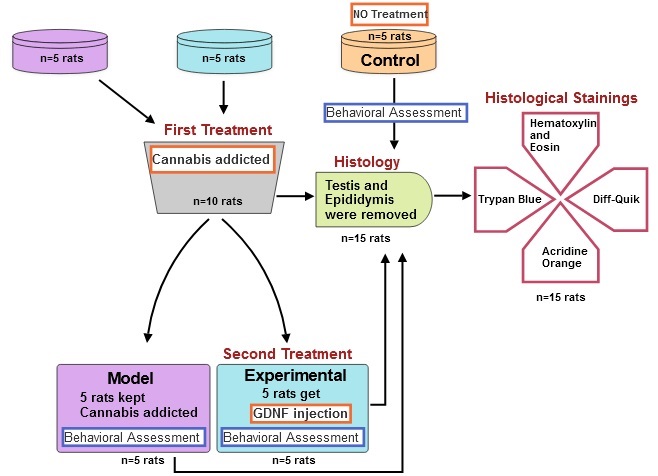Sat, Jan 31, 2026
[Archive]
Volume 23, Issue 2 (February 2025)
IJRM 2025, 23(2): 153-170 |
Back to browse issues page
Ethics code: IR.IAU.VARAMIN.REC.1401.048
Download citation:
BibTeX | RIS | EndNote | Medlars | ProCite | Reference Manager | RefWorks
Send citation to:



BibTeX | RIS | EndNote | Medlars | ProCite | Reference Manager | RefWorks
Send citation to:
Laleh R, Heydari Nasrabadi M, Khodarahmi P, Soltani J. Assessment of addiction behavior and spermatogenesis in glial cell line-derived neurotrophic factor-treated cannabis-addicted rats: An experimental study. IJRM 2025; 23 (2) :153-170
URL: http://ijrm.ir/article-1-3331-en.html
URL: http://ijrm.ir/article-1-3331-en.html
1- Department of Biology, Parand Branch, Islamic Azad University, Tehran, Iran.
2- Department of Biology, Parand Branch, Islamic Azad University, Tehran, Iran. ,heydarimitra45@piau.ac.ir
3- Department of Medical Radiation Engineering, Parand Branch, Islamic Azad University, Tehran, Iran.
2- Department of Biology, Parand Branch, Islamic Azad University, Tehran, Iran. ,
3- Department of Medical Radiation Engineering, Parand Branch, Islamic Azad University, Tehran, Iran.
Abstract: (876 Views)
Background: Cannabis addiction poses risks to male fertility by lowering levels of glial cell line-derived neurotrophic factor (GDNF), which is vital for spermatogenesis.
Objective: This research aimed to determine if the injection of exogenous GDNF into the brain of cannabis-addicted rats has a positive impact on their behavior and spermatogenesis.
Materials and Methods: This study involved 15 male Wistar rats divided into 3 equal groups: control, model, and experimental. Cannabis addiction was induced in the model and experimental groups using a smoking machine with a 0.25 gr dose per 5 rats, and the experimental group received a 0.5 mg GDNF treatment via stereotaxic injection. Behavioral changes were assessed through plus maze, open field, and sucrose preference tests before and after treatments. Sperm parameters were evaluated with H&E staining, sperm morphology with Diff-Quik staining, DNA damage and viability with acridine orange and trypan blue staining.
Results: Addicted rats displayed increased anxiety, which was improved by GDNF treatment (p < 0.05). Although cannabis significantly reduced germ cells and the size of the testis and epididymis compared to controls (p = 0.0006, p = 0.003), GDNF had a limited effect on these aspects. Cannabis significantly altered sperm morphology (p = 0.0016), but GDNF reversed abnormal sperms. GDNF improves sperm quality, reverses cannabis-induced sperm grading alterations (grade C, p = 0.0295), reduces DNA damage significantly (p = 0.0242), and enhances sperm viability, highlighting its potential to counteract some of cannabis's harmful effects on male reproductive health.
Conclusion: The findings of this experiment suggest that exogenous GDNF could be a potential therapeutic agent for cannabis addiction and sperm parameters.
Objective: This research aimed to determine if the injection of exogenous GDNF into the brain of cannabis-addicted rats has a positive impact on their behavior and spermatogenesis.
Materials and Methods: This study involved 15 male Wistar rats divided into 3 equal groups: control, model, and experimental. Cannabis addiction was induced in the model and experimental groups using a smoking machine with a 0.25 gr dose per 5 rats, and the experimental group received a 0.5 mg GDNF treatment via stereotaxic injection. Behavioral changes were assessed through plus maze, open field, and sucrose preference tests before and after treatments. Sperm parameters were evaluated with H&E staining, sperm morphology with Diff-Quik staining, DNA damage and viability with acridine orange and trypan blue staining.
Results: Addicted rats displayed increased anxiety, which was improved by GDNF treatment (p < 0.05). Although cannabis significantly reduced germ cells and the size of the testis and epididymis compared to controls (p = 0.0006, p = 0.003), GDNF had a limited effect on these aspects. Cannabis significantly altered sperm morphology (p = 0.0016), but GDNF reversed abnormal sperms. GDNF improves sperm quality, reverses cannabis-induced sperm grading alterations (grade C, p = 0.0295), reduces DNA damage significantly (p = 0.0242), and enhances sperm viability, highlighting its potential to counteract some of cannabis's harmful effects on male reproductive health.
Conclusion: The findings of this experiment suggest that exogenous GDNF could be a potential therapeutic agent for cannabis addiction and sperm parameters.
Type of Study: Original Article |
Subject:
Reproductive Biology
Send email to the article author
| Rights and permissions | |
 |
This work is licensed under a Creative Commons Attribution-NonCommercial 4.0 International License. |








